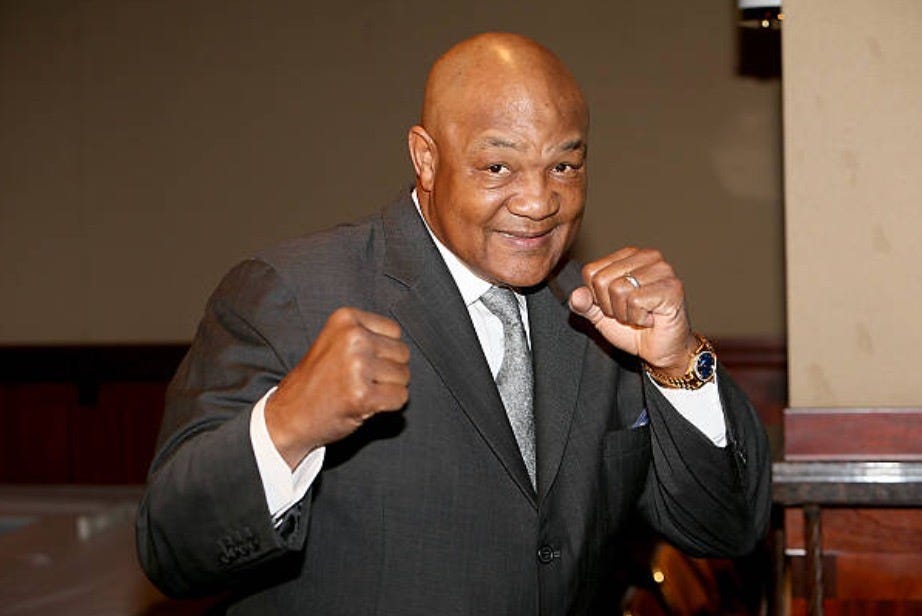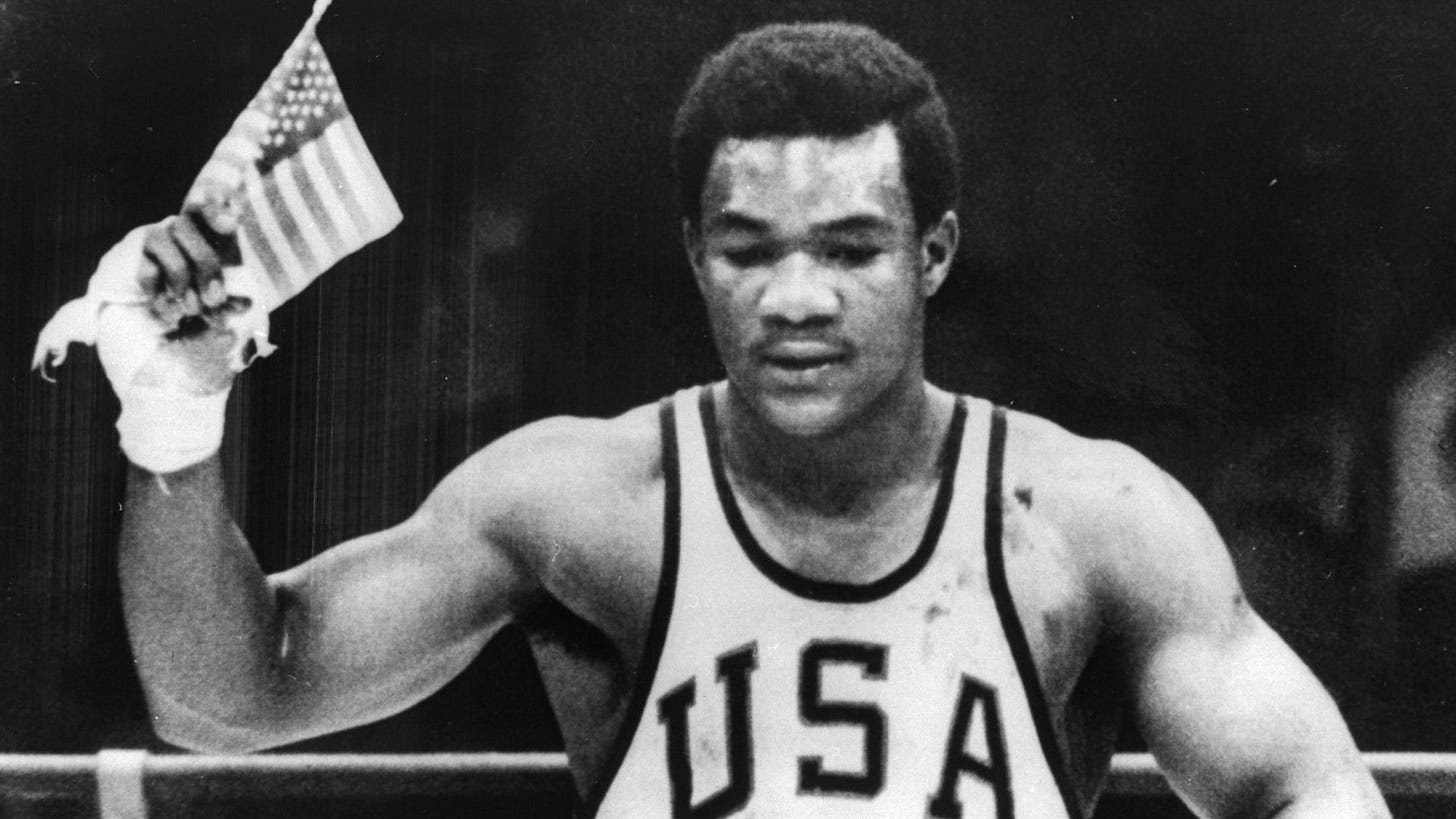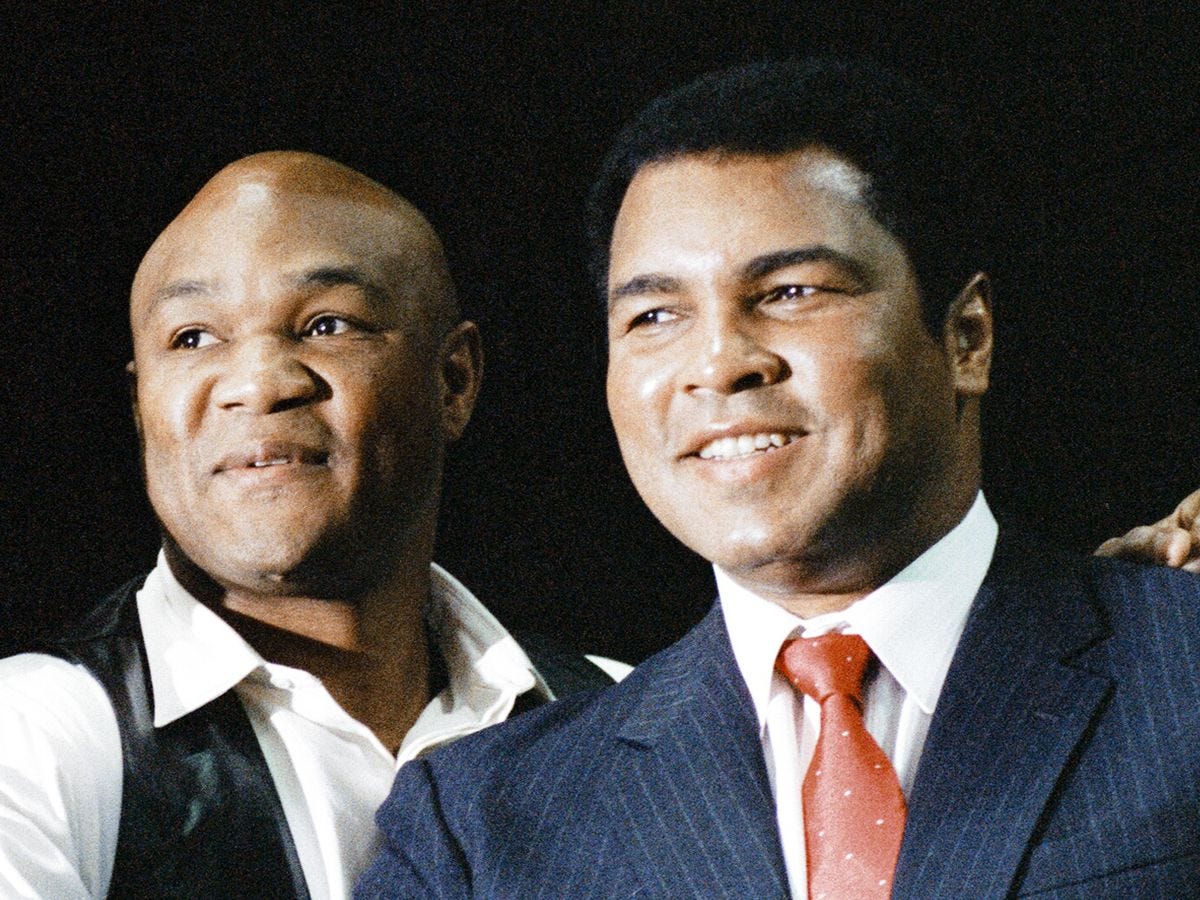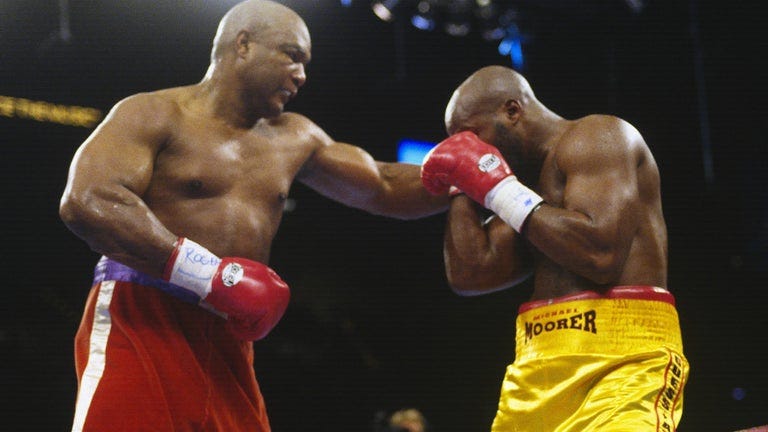Iconic two-time heavyweight champion George Foreman dies
Olympic gold medalist, preacher, pitchman, grill entrepreneur was 76
A note to Fight Freaks Unite readers: I created Fight Freaks Unite in January 2021 and eight months later it also became available for paid subscriptions for additional content — and as a way to help keep this newsletter going and for readers to support independent journalism. If you haven’t upgraded to a paid subscription please consider it. If you have already, I truly appreciate it! Also, consider a gift subscription for the Fight Freak in your life.
George Foreman, the larger-than-life, record-setting two-time heavyweight champion, who participated in some of boxing’s most iconic bouts and ultimately transcended the sport, died on Friday at his home in Houston, his family announced on social media.
He was 76. No cause of death was given.
“Our hearts are broken. With profound sorrow, we announce the passing of our beloved George Edward Foreman Sr., who peacefully departed on March 21, 2025 surrounded by loved ones,” the Foreman family’s post said. “A devout preacher, a devoted husband, a loving father, and a proud grand and great grandfather, he lived a life marked by unwavering faith, humility, and purpose.
“A humanitarian, an Olympian, and two-time heavyweight champion of the world, He was deeply respected — a force for good, a man of discipline, conviction, and a protector of his legacy, fighting tirelessly to preserve his good name — for his family. We are grateful for the outpouring of love and prayers, and kindly ask for privacy as we honor the extraordinary life of a man we were blessed to call our own.”
Born on Jan. 10, 1949, in Marshall, Texas, Foreman (76-5, 68 KOs), who was one of the most renowned and feared punchers of all time, was a Houston street bully, petty criminal and high school dropout before joining the Job Corps at 16 and taking up boxing at 17. He went on to win a 1968 Olympic gold medal in Mexico City before going on to two heavyweight championship reigns 20 years apart in a remarkable career that was the stuff of a Hollywood script.
It was a career that almost wasn’t as Bill Caplan, the International Boxing Hall of Fame publicist, who met a teenage Foreman and was close to him for nearly 60 years, explained to Fight Freaks Unite on Friday night.
I am in my 26th year of full-time boxing coverage. Take advantage of that experience by upgrading to a paid subscription for full access to all posts and comments — and support independent journalism.
Caplan was the ring announcer and publicist for a pro-am card in Oakland in 1966, when Foreman suffered his first amateur defeat.
“I saw him backstage afterward. He was so sad losing,” Caplan recalled. “I said, ‘Don’t worry about it, George, and I patted him on the back and said, ‘You’re going to be a good fighter someday,’ having no idea who he would become. In 1995 his New York Times bestseller (‘By George: The Autobiography of George Foreman’) came out and in one of the chapters it describes the first amateur loss and he said he was sitting in his dressing room thinking about quitting boxing until this celebrity, Bill Caplan, came into the dressing room and told me I’d be a good fighter someday. He said our hero, Joe Louis, lost fights. So, I decided not quit boxing.
“I read the book and I told him it was a good book but I have to ask you a question — why would you refer to me as a celebrity, because I was anything but. He said three reasons: first of all, you were wearing a tuxedo; second of all, you pointed to the corners and told the fighters where to go; third of all, I thought you owned the arena.”
Foreman would go on to Olympic glory and had his first pro fight in 1969 and last in 1997. But his career had two distinct acts because he retired from 1977 to 1987 before launching an improbable comeback and eventually regaining the heavyweight championship.
Foreman captured the heavyweight crown for the first time with an emphatic second-round knockout of Joe Frazier on Jan. 22, 1973 in Kingston, Jamaica, where legendary ABC broadcaster Howard Cosell authored the most famous call of his long career: “Down goes Frazier! Down goes Frazier!” Foreman knocked Frazier down six times, three times in the first round and three more in the second for the win.
On Nov. 5, 1994 at the MGM Grand in Las Vegas — nearly 20 years to the day after he lost he title to Muhammad Ali — Foreman was the underdog when he challenged champion Michael Moorer. Foreman lost virtually every second of the fight and had sopped up a lot of punishment before landing a crushing short right hand that knocked Moorer out in the 10th round to reclaim the title. Foreman was wearing the same trunks that he had worn when he lost the title to Ali two decades earlier.
“Anything you desire, you can make happen,” Foreman said after the fight. “It’s like the song, ‘When you wish upon a star your dreams come true.’ Well, look at me tonight.”
At age 45, Foreman had become the oldest man to win a world title, a record that Bernard Hopkins would eventually break. Once again, it was a legendary broadcaster, HBO’s Jim Lampley, who captured the moment of Foreman’s triumph with an unforgettable call: “It happened! It happened!”
While Foreman was still boxing he was also working as a commentator for HBO, where he teamed with Lampley and Larry Merchant for 12 years before retiring from broadcasting in 2004. He and Lampley had become close friends and despite his underdog status against Moorer, told Lampley repeatedly that he not only would knock out Moorer but described how the scenario would play out.
“He knew he would knock out Michael Moorer,” Lampley told Fight Freaks Unite on Friday night. “George had told me twice, maybe three times, that this was going to happen. And so when I said, ‘It happened, it happened,’ I was really speaking to him. I was replying to what he had told me: ‘You watch, Jim. There will come a moment late in the fight when he will come and stand in front of me and let me knock him out.’
“The precision of those words, if you go back and look, it’s so stunning. It’s exactly what happened. Moorer went and stood in front of him and let him knock him out and George told me that was exactly what was going to happen. Stunning. I feel so gifted and lucky to have known him and that we got to be friends and that I experienced his great wisdom.”
After winning the title for the first time against Frazier, Foreman successfully defended it twice, including by devastating second-round knockout of Ken Norton, before losing it to big underdog Ali on Oct. 30, 1974 in Kinshasa, Zaire (now the Democratic Republic of Congo), in “The Rumble in the Jungle,” which is seen by many as the most famous fight in boxing history. The story of the event was recounted in the Oscar-winning documentary “When We Were Kings.”
Employing his so-called “rope-a-dope” strategy, Ali planted himself along the ropes for long stretches of the fight and allowed Foreman to punch himself out. Although Ali took enormous punishment, Foreman indeed exhausted himself and Ali knocked him out in the eighth round to regain the championship in a mega upset. When the fight would inevitably come up, Foreman was self-deprecating when explaining what happened — that he was the dope in Ali’s rope-a-dope style.
Foreman would fight six more times before heading into a 10-year retirement. He followed the loss to Ali with a fifth-round knockout of contender Ron Lyle in the 1976 fight of the year. It was one of the most tumultuous fights in boxing history, an all-out slugfest in which both fighters were knocked down twice and badly hurt.
Foreman then knocked out Frazier in the fifth round of a rematch. On March 17, 1977, Foreman got knocked down and lost an upset 12-round decision to Jimmy Young, after which Foreman said he had a vision of God and knew he had to make changes to his life. He retired at age 28, became an ordained minister and preached at his Houston church.
A decade later, in need of money for his family and church, he returned to boxing in 1987. The comeback intrigued many but was also largely seen as farcical. But Foreman was serious and fought monthly, though against lesser opponents.
But Foreman kept winning and kept knocking foes out, including a massive second-round knockout of faded contender Gerry Cooney in 1990 that was seen as a credible victory and made believers out of many. In the 25th fight of the comeback, and at age 42, Foreman got a shot at undisputed champion Evander Holyfield in 1991 in Atlantic City, New Jersey.
The first modern pay-per-view fight, which was titled “The Battle of the Ages” in a play on the 14-year age gap between them, was a blockbuster, doing an extraordinary 1.4 million buys for upstart TVKO, which became HBO PPV. Although Holyfield won a unanimous decision it was an exciting and compelling fight. Foreman pushed Holyfield hard and it sent Foreman’s mainstream popularity sky-high as he lived up to what he had preached during the extensive buildup — that age was just a number.
It was during Foreman’s second act that he transformed himself from the aloof, stoic man with a constant scowl into an everyman: a jovial, hamburger-eating giant with a big smile. He became ubiquitous as a product pitchman but was also a businessman and philanthropist. He became well known for the George Foreman Lean Mean Grilling Machine, perhaps even more than he was famous for boxing. The grill carried his name, facsimile signature and sold more than 100 million units around the world. Besides what he earned for each grill sold, in 1999 he sold the rights to the machine for $137.5 million. He even starred in the short-lived ABC sitcom “George,” in which he played a retired boxer who helped troubled kids.
After the loss to Holyfield, Foreman won three fights in a row before a decision loss to Tommy Morrison for the vacant WBO title in 1993. It looked like that would be the end of Foreman’s career, but 17 months later, after lobbying then-HBO Sports president Seth Abraham, he returned for a shot at newly crowned champion Moorer, who had taken the title from Holyfield.
Foreman still had his vaunted power and turned out Moorer’s lights to regain the lineal crown, as well as the IBF and WBA titles, in one of the most memorable moments in boxing history. Foreman would eventually be stripped of his sanctioning organization belts for not doing mandatory defenses but it hardly mattered to the public. He would fight four more times, concluding his career at age 48 by losing the lineal title via heavily disputed majority decision to Shannon Briggs in 1997.
In 2002, Foreman was named one of the 25 greatest fighters of the past 80 years by The Ring magazine and was ranked as the ninth-greatest puncher of all time by the publication. In 2003, Foreman was inducted into to the International Boxing Hall of Fame in his first year of eligibility.
There was an outpouring of condolences and memories from the boxing community after his death was announced.
“George was a great friend to not only myself but to my entire family. We’ve lost a family member and are absolutely devastated,” said Top Rank chairman Bob Arum, who promoted most of the second act of Foreman’s career, including when he beat Moorer to regain the title.
Former undisputed champion Mike Tyson, who was once close to a showdown with Foreman in the early 1990s that ultimately never happened, paid his respects. “Condolences to George Foreman’s family,” Tyson posted on social media. “His contribution to boxing and beyond will never be forgotten.”
Wladimir Klitschko, another former heavyweight champion, who had tremendous affection and respect for Foreman, wrote, “Big George leaves a big void in the world boxing family and beyond. He embodied all the values that make ‘sweet science’ so unique. He wrote our most beautiful pages and a magnificent record. We will never forget him. Condolences to his family, friends and fans. RIP champ.”
Mauricio Sulaiman, the president of the WBC, whose title Foreman won from Frazier, posted, “Receiving sad news is a moment that sticks to your memory for life. The great George Foreman has passed away. Legendary boxing champion, life changing preacher, husband, father, grand and great grandfather and the best friend you could have. His memory is now eternal. May Big George rest in peace.”
Promoter Lou DiBella, who was an HBO Sports senior vice president during much of Foreman’s time at the network, knew him for many years and wrote, “Heartbroken. Rest easy, Big George. My condolences to his beautiful family and all who loved him. Hard to find any one, in boxing or any other sport, who so transformed their image into becoming a universally loved pop culture icon. As smart as he was strong. Truly a legend.”
Lampley issued a statement: “I am flooded with tears after learning of the death of my dear friend and broadcast partner George Foreman. I loved him. He was a great fighter and a far, far greater human being. Every great thing that ever happened to him, and there were many extraordinary blessings, was richly deserved. My thoughts and prayers are with his family and his friends and his congregation. It’s a massive loss, but I feel blessed and privileged to have known him and spent countless hours in his presence. He’s with Ali now, and they are at peace with each other.”
Foreman and Ali may have been ring rivals but they became great friends. Shortly after Ali died in 2016, Lampley spoke to Foreman about his relationship with Ali. He said Foreman told him that he and Ali would speak regularly, something few were aware of.
“We would call each other at midnight and only we knew that we had these conversations, and we talked about all sorts of things other than boxing,” Lampley told Fight Freaks Unite, recounting what Foreman told him. “That was the whole point, to talk about things other than boxing, because everybody else in our lives talked to us about boxing.
“And I said, ‘Well did you talk about religion?’ He said, ‘Why would you ask that?’ And I said, ‘Because you’re a fundamentalist Christian preacher and he was a practicing Muslim.’ And he said, ‘Yes, we did talk about religion.’ And I said, ‘So how did you find common ground?’ He said, ‘Jim, we eventually agreed that good is good and bad is bad, and any morally conscious person knows the difference, and on that basis we achieved common ground.’ I’ve never forgotten it. It was so striking to me. The way he said it was so simple, so direct, so George.”
Foreman, who was married five times and had 12 children, is survived by his wife, Mary Joan Martelly, whom he married in 1985. His other survivors include his brother, Roy, and 11 children: daughters Natalia, Leola, Michi, Georgetta, Isabella and Courtney and sons — all named George — George Jr., George III, George IV, George V and George VI. Daughter Freeda, who had six professional boxing matches, died in 2019.
Caplan knows the Foreman family well and considered George a part of his own family.
“He was like a family member, like a brother. He was a best friend,” Caplan said. “The relationship was to the point that George will never be dead to me. He will live on forever.”
A note to subscribers
I sincerely appreciate your readership. If you’re reading, it means you love boxing just like I do. If you’ve been reading you also know the quality and quantity of what I produce. It’s one-stop shopping. Read the newsletters and there is no need to search multiple websites or click a multitude of links to get the latest news, opinion and detailed fight schedule. Everything you need is in one spot and delivered directly to your inbox (or via phone alert if you download for free the superb Substack app). You don’t have to hunt for the news; it comes to you.
I believe that is worth something, so while I will continue providing stories, notes and the schedule for free, I encourage you to upgrade to a paid subscription for the most content. A paid subscription is your way of keeping this reader-supported newsletter going and supporting independent journalism. I am beholden to no network, promoter, manager, sanctioning body or fighter. If you have read my work at all during the past 25 years I’ve covered professional boxing you know that I keep it real and that will not change.
To upgrade your subscription please go here:
Thank you so much for your support of Fight Freaks Unite!
Follow me on Instagram: https://www.instagram.com/danrafael1/
Follow me on Twitter: https://twitter.com/DanRafael1
Follow me on Facebook: https://www.facebook.com/DanRafaelBoxing









What an elegantly written and moving summary of the life of the great man. Thanks, Dan
Top Notch article. RIP Big George